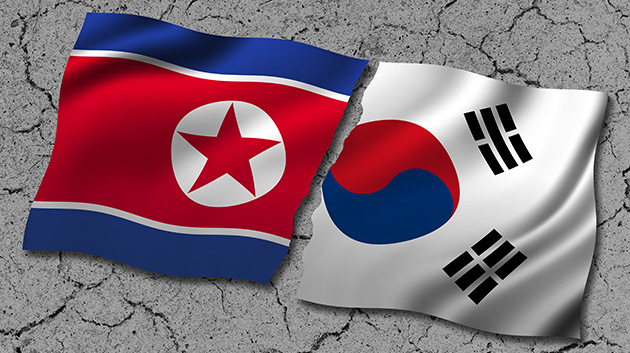North and South Korea for a Unified Team at the Olympics
U.S. Negotiator Says Talks With North Korea Are a Waste of Time
Key points in this article:
- South Korean President Moon Jae-in has invited North Korea to form a unified team at the 2018 Winter Olympics
- A U.S. representative says that talks with North Korea are a waste of time, and we should instead focus on strengthening sanctions
- We must learn from the mistakes of the Appeasement Policy instigated by Kim Dae-jung
The South Korean President, Moon Jae-in, proposed that they form a unified team with North Korea for the upcoming 2018 Winter Olympics. Do Jong-hwan, from the Ministry of Culture, Sports and Tourism, first proposed this idea of a unified team, and it is a concrete step toward Moon’s dream of a reunified Korea.
Moon has also been pursuing exchanges with North Korea in the field of sports. In his speech at the World Taekwondo Federation, he said he wanted to feel the same emotions as when he saw North and South co-participating in sporting events such as the 1991 World Table Tennis Championships, the 1991 FIFA World Youth Championship, and the 2000 Sydney Olympic Games.
Tragedies During the Sydney Olympic Games
One of the moments Moon mentioned, when the two Koreas did a joint march in the Opening Ceremony of the Sydney Olympic Games, has a backstory.
In June of that year, talks were held between the leaders of both countries. This marked the first-time talks were held between leaders of the two Koreas since their separation in 1948, and earned President Kim Dae-jung a Nobel Peace Prize.
The talks, however, were staged.
The following are passages from a book by Kim Ki-sam, a former South Korea Intelligence Agent:
“In late 1999, when the world was waiting in anticipation for the millennium year, Kim Dae-jung and Kim Jong-il agreed on a top-secret side deal. The bribes Kim Dae-jung gave North Korea amounted to US$1.5 billion.”
Kim Ki-sam testified that the bribe money was first converted to Euros in Germany and France before being delivered to North Korea.
“[Kim Jong-il] used this money to buy nuclear development essentials, such as trigger devices, from Pakistan, Afghanistan and France . . . Kim Dae-jung’s proud Nobel Peace Prize is a trophy made from the blood, tears and anguished cries of fellow North Koreans, and South Korean taxpayers’ efforts”.
The talks between the leader of North and South were centered around civilian matters such as projects to reconnect families that were separated by the 38th parallel, and the joint march at the Olympic Opening Ceremony. The seemingly harmonious atmosphere fooled the Nobel Committee.
From this, we can see that the leaders used the joint march at the Sydney Olympics for their own interests.
In May, the current South Korean President gave a speech at the memorial event of the Gwangju Uprising.”The new Moon Jae-in government is an extension of the Gwangju democratic movement,” he said.”We have inherited the spirit of the June Struggle, the Kim Dae-jung administration and the Roh Moo-hyun administration.”
The Gwangju Uprising was a protest demanding suffrage in the presidential elections, and ended up being a major genocide. Kim Dae-jung, who was later arrested, was in fact the flag bearer of the uprising.
Kim Dae-jung was also the one who proposed the Sunshine Policy, a North Korean appeasement policy. Roh Moo-hyun continued this, and now Moon Jae-in has inherited it. If these trends continue, the same nightmare of the Uprising could repeat itself.
North Korea Negotiations Are Pointless
Bruce Klinger, Senior Research Fellow at the Heritage Foundation, held unofficial talks with North Korean authorities in May.”Our recent experience suggests that trying to talk to supreme leader Kim Jong-un is a waste of time,” he commented in his article in the Washington Post.
He pressured the North Korean representatives into complying with the U.N. resolutions for denuclearization, but”the answer was an emphatic, unwavering no. Citing the fates of Iraq’s Saddam Hussein and Libya’s Moammar Gaddafi, the North Koreans repeatedly said that their nuclear program is the ultimate life preserver for the regime.”
Klinger mentioned that a preemptive strike would invite major retaliation as the North Koreans,”did not struggle to acquire nuclear weapons only to perish without using them”. He suggested that Trump”ramp up sanctions . . . [which] would impose a penalty on North Korea, without risking a war – and could conceivably hasten the day the Kim regime finally collapses”.
Do Not Repeat the Sin of the Sunshine Policy
The U.S. is probably preparing military measures against North Korea. Even amidst these heightening tensions, the element that could largely affect how safely we can get over this crisis is for each country to contribute to the economic sanctions against North Korea.
If a unified Korean team is formed for the Winter Olympics, there is a danger that North Korea will be able to overcome the sanctions. Learning from what happened during the Sunshine Policy, North Korea will probably use any additional funding on their nuclear developments.
“If it wasn’t for the Sunshine Policy, The North Korean Kim Jong-un regime would have collapsed by now,” said Do Myung-hak a former North Korean government official and defector. If something is not done, Moon will continue down the same path as Kim Dae-jung.
The neighboring countries and other dominant powers must remain wary of South Korea, and work to enforce more effective economic sanctions. We must learn from history that appeasement only brings further unhappiness.



















